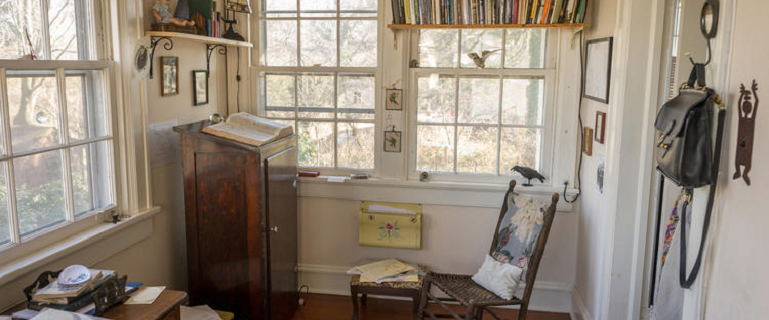RICHMOND, Va. — The ceiling fixture in Claudia Emerson's study only weakly puts out light. Her husband, Kent Ippolito, apologizes for it, but it's no bother. The room isn't oriented toward the house. High atop the second story in a quiet neighborhood in Richmond, with sunlight streaming in on three sides, this is an observation post for a poet attuned to the natural world.
It's a private place, and we hadn't planned on visiting it. The last thing Ippolito told me before we drove over was that he hadn't been able to bring himself to spend any time here.
The room, with its antique touches that lend it a retrospective mood — a deconsecrated lectern holding a massive Webster's dictionary, an Audubon print of Acadian owls, corkboard pushpins made from round typewriter keys — is hard to reconcile with her absence. It's an expectant room, remaining ready for her to resume her work.
From her desk, Emerson would gaze into the back yard.
“She liked angry-looking birds,” Ippolito says, creatures that, even in their interactions with people, retain their wildness. And she liked to explore the border skirmishes between the domestic and the wild, in poems describing birds trapped in rooms, houses choked by vines, animals tormented by children. At the corner of the yard stands a treehouse. Emerson would have her creative-writing students from Virginia Commonwealth University climb the steep metal extension ladder to a perch among the branches.
“She called it ‘treeshop,' instead of ‘workshop,'” Ippolito says.
When Emerson won the Pulitzer Prize in 2006, bringing her the kind of attention poets don't dare dream of and setting her up to become poet laureate of Virginia a couple of years later, there was no indication it would be the midpoint of a brief and celebrated career. In early December she died at age 57 from the complications of colon cancer that had spread to her liver and her brain.
She left behind five well-received volumes of verse and three that are tentatively scheduled to be released over three years. The next of these, “The Opposite House,” is just out from Louisiana State University Press.
For Ippolito, Emerson's work is more than a reminder of her. It often delved deeply into their lives and their pasts with a kind of grace and unflinching precision not found in any family photo album or stream of facebook posts. Her poems were perfectly tuned, multiple acts of observation that invoked past and present, and deceased and living.
She wrote about the land that formed her — the disappearing tobacco farms and the lode of uranium that lies beneath cattle pastures near her childhood home in Chatham, Virginia. She wrote about the deaths, in quick succession, of her brother and father.
An interviewer once described her as “an architect of sorts, constructing rooms in which the dead might be resurrected.”
In “Late Wife,” the book that won her the Pulitzer, she wrote of the divorce that forced her to start over at middle age. For her, her life with Ippolito was inseparable from the memory of Ippolito's first wife, Lynne, who died, as Claudia herself would die, of cancer, far too young.
In several poems she confronts herself with Lynne's memory, acutely aware that her own happiness never would have existed without the grave loss that preceded it. “Artifact” finds her and Kent sleeping beneath a quilt Lynne had made, “as though beneath/ her shadow, moving with us, that dark, that soft.”
In “Homecoming,” she describes a video Lynne had shot of the Ippolitos' dog welcoming Kent home. Emerson detects Lynne's presence in a cough on the tape and in “the motion of her chest/in the rise and fall of the frame.” Kent enters “to look into the camera she holds,/ and past her into me — invisible, unimagined/ other who joins her in seeing through our/ transience the lasting of desire.”
Ippolito understood Emerson's urge to excavate the past, even though he does not share it. He has read the poem, but it's been some time. And he doubts he'll ever watch the video again.
“That video contains Lynne and her voice and something very joyous for her, a very happy moment,” he says. “I find it helpful to remember that those joyous, happy times occurred, but it's also kind of painful.”
On the way out to see the treehouse, we pause in a room ringed with stringed instruments: guitars, banjos, tenor guitars, mandolins, a mandola, a mandocello, a zither. Ippolito, a musician, began collecting them in earnest after his first wife's death.
On the wall hangs Emerson's guitar, a 1951 Gibson L-4 she played often with him.
He points to a corner where he has just set up what he calls an “unbelievably confounding” machine: a pedal steel guitar, an instrument born to cry.
Read more: At Home With The Late Poet Claudia Emerson's Memory






